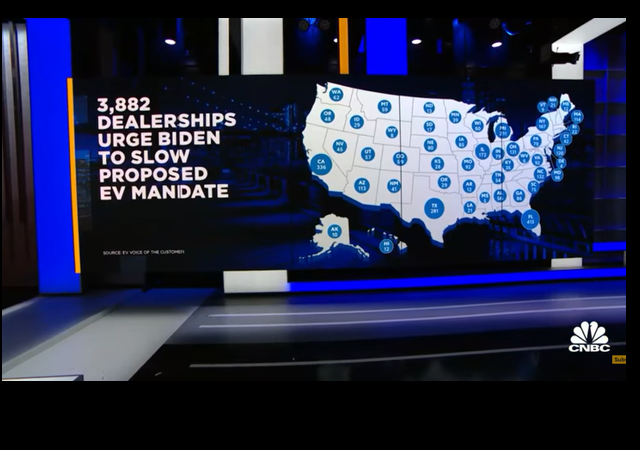Renewed Opposition To EV Mandates From Car Dealerships

Table of Contents
Financial Concerns and Infrastructure Readiness
Dealerships are facing significant hurdles in adapting to the EV revolution, primarily due to substantial financial burdens and inadequate infrastructure support.
High Initial Investment Costs for Dealerships
The transition to selling and servicing EVs requires dealerships to make significant upfront investments. This includes substantial capital expenditure across several areas:
- Showroom Upgrades: Displaying and showcasing EVs often necessitates modifications to existing showrooms, including specialized charging stations and updated displays.
- Specialized Technician Training: EV mechanics require specialized training to handle high-voltage systems and complex EV technology, incurring significant training costs.
- Investment in Charging Infrastructure: Dealerships need to invest in fast-charging stations, both for customer use and for servicing vehicles. This investment can be substantial, particularly for larger dealerships.
The lack of sufficient government support or incentives for these upgrades exacerbates the financial strain on dealerships. The risk of significant financial losses looms large if EV sales don't materialize as projected, creating a considerable financial gamble for many businesses. This uncertainty is a core component of the renewed opposition to EV mandates.
Lack of Consumer Demand and Charging Infrastructure
Another critical factor contributing to the renewed opposition to EV mandates from car dealerships is the current mismatch between consumer demand and the available charging infrastructure. Several factors contribute to this:
- Insufficient Public Charging Stations: The number of public charging stations, particularly fast-charging stations, remains insufficient to meet the potential demand from a widespread adoption of EVs.
- Uneven Geographical Distribution: The existing charging infrastructure is unevenly distributed, with many rural areas and underserved communities lacking adequate access.
- Long Charging Times: Compared to the speed of gasoline refueling, charging EVs, even with fast chargers, still takes significantly longer, contributing to range anxiety among potential buyers.
This lack of robust charging infrastructure directly impacts consumer confidence and ultimately affects the viability of EV sales for dealerships, strengthening the argument against aggressive mandates.
Challenges in Sales and Service of EVs
Beyond the financial implications, dealerships face significant operational challenges in successfully integrating EVs into their businesses.
Specialized Training and Expertise
Effectively selling and servicing EVs requires specialized knowledge and skills that traditional dealerships may lack.
- Training Costs: Training sales staff to effectively communicate the benefits and complexities of EV technology represents a significant cost.
- Certifications Needed: Mechanics require specific certifications and training to work on high-voltage systems, adding to training expenses and time commitments.
- Specialized Tools and Equipment: Servicing EVs requires specialized tools and equipment, further increasing investment needs.
This expertise gap represents a considerable hurdle in the smooth transition to EV sales and service.
Inventory Management and Supply Chain Issues
Forecasting EV demand and managing inventory is proving particularly challenging.
- Longer Lead Times: Ordering EVs often involves longer lead times compared to gasoline-powered vehicles, making inventory management more complex.
- Unpredictable Supply of EV Parts: Supply chain disruptions can impact the availability of EV parts, creating delays in servicing and repairs.
- Potential Inventory Holding Costs: The risk of holding unsold EVs due to fluctuating demand adds to the financial burden.
These supply chain issues and the uncertainty they create further fuel the renewed opposition to EV mandates from car dealerships.
Concerns Regarding Government Regulations and Mandates
Dealerships also voice strong concerns about the nature and implementation of government regulations and mandates.
Unrealistic Timelines and Implementation Challenges
Many dealerships believe that the timelines set for EV adoption are unrealistic and fail to consider the practical challenges involved.
- Insufficient Lead Time for Adaptation: The rapid pace of mandated change leaves dealerships with insufficient time to adapt their infrastructure, training, and operations effectively.
- Stringent Regulations: The complexity and stringency of regulations surrounding EV sales and servicing add to the administrative burden and compliance costs.
- Potential for Fines and Legal Repercussions: Dealerships fear penalties and legal repercussions for failing to meet mandated sales targets.
These factors contribute significantly to the resistance against EV mandates.
Lack of Government Support and Fair Competition
Dealerships argue that governments are not providing sufficient support to facilitate the transition to EV sales, creating an uneven playing field.
- Insufficient Funding for Infrastructure: Limited government investment in charging infrastructure places an undue burden on dealerships to shoulder these costs independently.
- Unequal Playing Field for Dealerships: Direct sales of EVs by manufacturers pose unfair competition to traditional dealerships, further impacting their profitability.
- Lack of Clear Guidelines: A lack of clear and consistent guidelines from governments creates uncertainty and makes it challenging for dealerships to plan effectively.
Conclusion: The Future of EV Adoption and the Role of Dealerships
The renewed opposition to EV mandates from car dealerships stems from a confluence of financial, logistical, and regulatory challenges. The high initial investment costs, inadequate charging infrastructure, complexities in sales and service, and concerns about unrealistic timelines and government support all contribute to the resistance. A collaborative approach is essential. Governments need to work with dealerships to provide sufficient support, including financial incentives, infrastructure investment, and clear, achievable targets. Only through a partnership that addresses the concerns outlined above can we ensure a smooth and successful transition to a sustainable transportation future. Further research into the impact of renewed opposition to EV mandates from car dealerships is crucial to navigate this critical juncture in the automotive industry. We encourage readers to delve deeper into this important debate to foster informed discussions and effective solutions.

Featured Posts
-
 Virginia Giuffre Dies Remembering The Epstein Accuser
Apr 28, 2025
Virginia Giuffre Dies Remembering The Epstein Accuser
Apr 28, 2025 -
 Investigation Reveals Lingering Toxic Chemicals In Buildings After Ohio Train Derailment
Apr 28, 2025
Investigation Reveals Lingering Toxic Chemicals In Buildings After Ohio Train Derailment
Apr 28, 2025 -
 2000 Yankees Season Remembering The Royals Win
Apr 28, 2025
2000 Yankees Season Remembering The Royals Win
Apr 28, 2025 -
 Hudsons Bay Liquidation Sale Deep Discounts On Remaining Inventory
Apr 28, 2025
Hudsons Bay Liquidation Sale Deep Discounts On Remaining Inventory
Apr 28, 2025 -
 Nfl Draft 2024 Shedeur Sanders To Cleveland
Apr 28, 2025
Nfl Draft 2024 Shedeur Sanders To Cleveland
Apr 28, 2025
Latest Posts
-
 Is This Red Sox Outfielder The Next Jarren Duran A Breakout Season Prediction
Apr 28, 2025
Is This Red Sox Outfielder The Next Jarren Duran A Breakout Season Prediction
Apr 28, 2025 -
 Orioles Announcers Jinx Finally Snapped After 160 Game Streak
Apr 28, 2025
Orioles Announcers Jinx Finally Snapped After 160 Game Streak
Apr 28, 2025 -
 Orioles Broadcasters Jinx Broken 160 Game Hit Streak Ends
Apr 28, 2025
Orioles Broadcasters Jinx Broken 160 Game Hit Streak Ends
Apr 28, 2025 -
 2000 Yankees Examining Joe Torres Leadership And Andy Pettittes Performance Against Minnesota
Apr 28, 2025
2000 Yankees Examining Joe Torres Leadership And Andy Pettittes Performance Against Minnesota
Apr 28, 2025 -
 A Look Back The 2000 Yankees Joe Torre And Andy Pettittes Crucial Win
Apr 28, 2025
A Look Back The 2000 Yankees Joe Torre And Andy Pettittes Crucial Win
Apr 28, 2025
